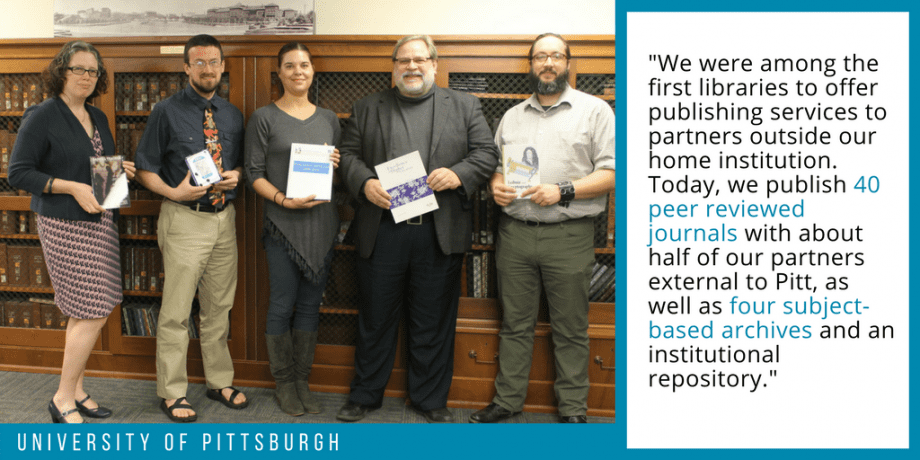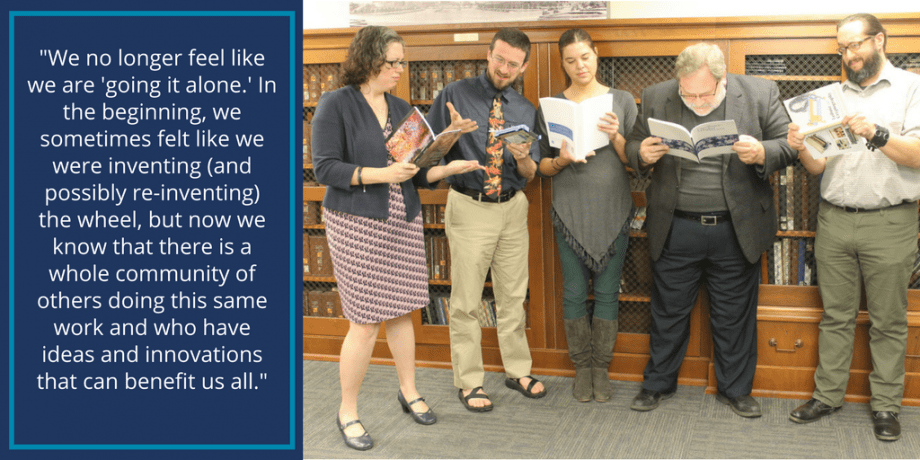As we gear up for the Library Publishing Forum and the start of a new membership year in July, we are publishing a series of member profiles. These profiles will showcase the wide variety of publishing work happening at member institutions, and celebrate our community’s contributions to the wider publishing landscape. Many thanks to the members who agreed to answer our questions! See all of the published profiles, and look for a new one each week until the Forum.
To learn more about their program, check out Pitt’s latest Library Publishing Directory entry.
Tell us a bit about your publishing program.
Our journal publishing program was a natural outgrowth of our work with subject-based open access repositories going back to 2001. We were among the first libraries to offer publishing services to partners outside our home institution. Today, we publish 40 peer reviewed journals with about half of our partners external to Pitt, as well as four subject-based archives and an institutional repository. Our portfolio includes titles in the humanities, social sciences, technology, law, and health sciences. Our partners are diverse and range from Pitt student groups, scholarly societies, and teams of independent scholars around the world. We are committed to making open access a reality for publication and realize that libraries can do more than advocate – we can take action in this space to lower the costs of publishing and make tangible progress towards making scholarship available to all to read and use. Whenever we can, we use open source software for our publishing and our repositories because we believe that the best future is one where the community owns the infrastructure.

Tell us something you have accomplished with your program that you’re proud of – big or small.
We partner with external organizations beyond the University of Pittsburgh to make open access publishing an option for journals around the world who do not have the expertise and resources to publish on their own and cannot afford the high operating costs of working with commercial publishing services. Through this work, we are proud to have helped to foster scholarly discourse in several emerging fields of study such as blockchain technology and telemedicine.
Through our development partnership with the Public Knowledge Project, we contribute to the open source publishing software used by our publishing program and other journals around the world; some examples of this work include incorporating altmetrics and alternative peer review processes.
We are also very proud to be the host of PhilSci Archive, a preprint archive for the Philosophy of Science discipline. This archive was launched in 2001 and was one of the forerunners in the movement to share preprints.
Looking ahead, what are you excited about, or what’s on the horizon for your program?
We are looking forward to continuing to develop our open source software platforms to work on vertical integration and are very excited to see more libraries being active in this area. We’ll be at the Library Publishing Forum preconference in May to learn all about the new options, and we are keeping a careful eye on this space. Our library publishing program is also being increasingly aligned with our Digital Scholarship Services on campus, which will bring more opportunities to meet scholars doing innovative work and new potential for partnerships.
Tell us about an obstacle you are facing in your work or one that the field is facing as a whole.
One of the issues that we face is the problem of scale. As our program has grown, we have had a few growing pains as we realized how big our program was – and how big it could be – and how small publishing programs are in the broader scope of library work. We run on a fairly lean staff, and we have had to work on our policies and programs to make sure that we provide good service for all of our journal clients. As we work to provide library publishing service to our clients, we also face the issue of vertical integration of platforms by the commercial publishers as they acquire or create services that span the entire research lifecycle, not just publication. We find that as a library, we can do one or two things well; when there are these many platforms that are being integrated into the publishing process by commercial entities, our programs aren’t always able to scale at that rate and we need to work across libraries to manage our work in this landscape. It is a challenge to find good partners who share our values and fit well into our existing practices, and the Library Publishing Coalition is a valued resource in this space.

Tell us about your experience participating in the community of library publishers. Has that experience influenced you or your work?
We no longer feel like we are “going it alone.” In the beginning, we sometimes felt like we were inventing (and possibly reinventing) the wheel, but now we know that there is a whole community of others doing this same work and who have ideas and innovations that can benefit us all. From the questions and insights of others, we are inspired to reflect on our own practices, and our long experience in this field can also provide some guidance for those who are starting out their own programs.
